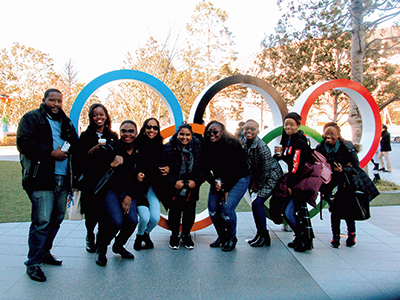Diplomatic Bluebook 2021
Chapter 2
Japan's Foreign Policy by Region
2 Regional Organizations
In addition to the Forum for East Asia-Latin America Cooperation (FEALAC) and the Community of Latin American and Caribbean States (CELAC1), the following regional organizations in the LAC region conduct policy coordination on various issues. In March, Japan invited seven young officials from FEALAC member states to exchange views on the utilization of science and technology to achieve the SDGs.
- 1 CELAC: Comunidad de Estados Latinoamericanos y Caribeños (Community of Latin American and Caribbean States)
(1) Pacific Alliance
The Pacific Alliance (Chile, Colombia, Mexico, and Peru; hereafter referred to as “PA”) aims to conclude a comprehensive free trade agreement with Australia, Canada, New Zealand, and Singapore, and is currently conducting negotiations toward an early conclusion of the agreement. In addition to these four countries, the Republic of Korea (ROK) and Ecuador are expressing interest in participating in the negotiations.
Japan places importance on cooperation with the PA, with which Japan shares fundamental values. In November, Japan participated in a teleconference meeting between the PA and observer countries, and confirmed the importance of cooperation between the PA and Japan.
(2) Common Market of the South (MERCOSUR2)
MERCOSUR is a customs union composed of Argentina, Brazil, Paraguay, Uruguay, and Venezuela.3 With a few exceptions, tariffs have been eliminated for all goods traded within the region since January 1995. In addition, Bolivia is an Associated State.4
Japan has held the “Dialogue to Strengthen the Economic Relationship between Japan and MERCOSUR” a total of four times since 2012, and conducts exchanges of views on trade policies and investment.
- 2 MERCOSUR: Mercado Común del Sur (Southern Common Market)
- 3 Venezuela's participation qualifications have been suspended as of December 2020
- 4 Bolivia signed the participation protocol in December 2012, and is awaiting approval by the National Congress of Brazil
(3) Caribbean Community (CARICOM)
CARICOM was founded by 14 Caribbean nations for its economic integration and foreign policy coordination. It has a large presence in the international arena for their coordinated actions. Although CARICOM countries include many countries with relatively high incomes, they are threatened by natural disasters such as catastrophic hurricanes almost every year, and also have vulnerabilities particular to small island states due to the small size of their populations and economies.
Japan is leading its diplomacy in accordance with the three pillars for Japan-CARICOM cooperation ((1) Cooperation toward sustainable development, including overcoming the vulnerabilities particular to small island states; (2) Deepening and expanding fraternal bonds of cooperation and friendship; and (3) Cooperation in addressing challenges of the international community). Japan is also providing support to high income level countries based on their development needs and economic capabilities. In the Juntos!! Japan-Latin America and the Caribbean Exchange Program held from January to February, 11 young diplomats were invited from CARICOM countries to deepen their understanding of Japan through visits to facilities related to the environment and disaster prevention, and to facilities related to the Olympic Games. In addition, under the circumstances in which international travel was restricted due to the impact of COVID-19, Japan strengthened relations with each country and Japan-CARICOM relations utilizing online methods. Teleconference meetings were held between State Minister for Foreign Affairs Suzuki Keisuke and the Foreign Minister of Haiti (July), and also between State Minister for Foreign Affairs Uto Takashi and the Foreign Ministers of Trinidad and Tobago as well as Guyana (October), and Antigua and Barbuda (November).
 Juntos!! Japan-Latin America and the Caribbean Exchange Program (young diplomats and government officials for CARICOM member states) (February 2, Japan Olympic Museum;Photo: JTB)
Juntos!! Japan-Latin America and the Caribbean Exchange Program (young diplomats and government officials for CARICOM member states) (February 2, Japan Olympic Museum;Photo: JTB)